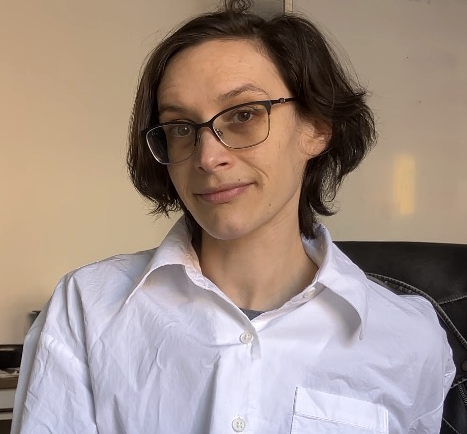Chris Martens
Associate ProfessorKhoury College of Computer Sciences
College of Arts, Media, and Design
Northeastern University
Ph.D. in Computer Science
Carnegie Mellon University
Email: c.martens at northeastern.edu
Office: Meserve 138 (Boston campus)
Pronouns: they/them

Research Interests
I am interested in elegant computational abstractions that support creative practices. Since I view programming and mathematics as creative practices, this is a purposefully broad scope, but my prior work has been situated mainly in the scope of representing and reasoning about rule systems. Rule systems show up in my work via games (rules as game mechanics), privacy policies (rules as governance documents), procedural design and data generation (rules as constraints and search directives), and inference rules defining programming languages (e.g. in the context of mechanizing metatheory).
My weapon of choice is the deep relationship between (constructive) logics and computation, via (1) logic programming and (2) type systems. This often means extrapolating interesting logics (e.g. substructural, epistemic, modal) into type systems and logic programming languages. Polarity and focusing pervade my thinking about type structure and language design. I believe in the broad potential of dependently-typed languages, largely because they blur the proof/program distinction.
At Northeastern, I am affiliated with the Programming Research Laboratory (PRL) and Games at Northeastern.
Teaching
- In Spring 2026, I am teaching CS 4400: Programming Languages.
- In Fall 2025, I taught CS 7480: Special Topics in Programming Languages: Polarity and Focusing.
- In Spring 2025, I taught GSND 6460: Generative Game Design.
- In Fall 2024, I taught CS 7400: Intensive Principles of Programming Languages.
- In Spring 2024, I taught a mini course on Logical Frameworks.
- In Spring 2023, I taught Generative Game Design (GAME 4460/GSND 4660).
- In Fall 2022, I taught Programming Languages for Virtual Worlds (CS 7480).
- Before that, I taught classes at NCSU.
Professional Activities
- Program Committee, POPL 2025
- Invited speaker, TYPES 2025: "A guided tour of polarity and focusing"
- Review Committee, OOPSLA 2025
- Organizer, NEPLS at Northeastern, September 2024
Students and Collaborators
- Emma Tosch, Ph.D. (research scientist)
- Luis Garcia, Ph.D. student
- Cynthia Li, Ph.D. student
- Joseph Rotella, Ph.D. student
Alumni
- Markus Eger, Ph.D. NCSU (now faculty at Cal Poly Pomona)
- Alexander Card, Ph.D. NCSU (now faculty at NCSU)
- Sasha Azad, Ph.D. NCSU (co-advised with Arnav Jhala)
- Abhijeet Krishnan, Ph.D. NCSU (co-advised with Arnav Jhala)
Working Drafts
- Epistemic Logic for Polyglots. With Luis Garcia. Presented at PEPM 2026.
Featured Publications
Substructural
Parametricity.
C. B. Aberlé, Karl Crary, Chris Martens, and Frank Pfenning.1
FSCD 2025.
(DOI | ArXiv preprint).
1 Authors listed alphabetically.
Finite-Choice Logic
Programming.
Chris Martens, Robert J. Simmons, and Michael Arntzenius.
POPL 2025,
Denver, CO, January 2025. (ArXiV
| DOI)
- Talk recording
- Slides with transcript
- Blog post by Rob
- Implementation: the Dusa programming language
Modeling
Game Mechanics with Ceptre.
Chris Martens, Alexander Card, Henry Crain, and Asha Khatri.
In IEEE Transactions on Games, July 2023.
Funded Projects
Explorable Formal Models of Privacy Policies and
Regulations.
Funding source: NSF
CAREER Award (2019-2024)
People: Emma Tosch, Luis Garcia, Chinmaya Dabral
Aims: We are developing techniques to represent privacy policies
and regulations that are both formal and explorable, permitting users and
policy crafters to answer 'what if'? questions about specific scenarios
in addition to providing provable guarantees. We are formalizing
privacy documents and scenarios using a relational programming model
known as Answer Set Programming (ASP) as a lightweight
semantic modeling framework, in which we have build a narrative planner
that generates partial-ordered event structures from agent intentions and
capabilities. We are augmenting ASP and narrative planning with support
for answering queries, generating scenarios that reveal privacy
loopholes, generating counterexamples to global correctness conditions,
suggesting repairs for broken policies, and enabling the exploration of
hypothetical scenarios by policy developers and users.
Formal Methods in Software Support for Sound
Experimentation.
Funding source: NSF FMITF (2022-2026)
People: Emma Tosch (PI) (My role: co-PI)
Aims: This project will produce a high-level domain-specific
language (DSL) for experimentation that enforces constraints on
hypotheses, analyses, and treatment assignment according to the
underlying principles of experimental design. Experiments written in this
language will be correct by construction vis a vis consistency of
hypotheses and treatment assignments with respect to their identifiable
effects. The team will then integrate the experimentation DSL into legacy
socio-technical software for education, leveraging existing support for
gradual typing to implement an orthogonal type system for experimental
interventions. To evaluate these tools and promote continued research
around formal methods approaches to the experimentation-analysis
pipeline, the team will build a publicly available searchable experiment
repository.
Notes, Slides, and Drafts
- Talk slides: Parametricity for ordered functional programs, Northeastern PRL, November 2024.
- Talk slides: In Search of Deductive Possibility Spaces, UPenn PLClub, March 2024.
- Note: Focusing in logic programming
- Note: Substructural logics, presented as a talk to Northeastern PRL Seminar.
- Workshop paper: Exploring Consequences of Privacy Policies with Narrative Generation. Chinmaya Dabral, Emma Tosch, and Chris Martens. Presented at Workshop on Programming Languages and the Law (ProLaLa @ POPL '23), Boston, MA, January 2023.
Recorded Talks
- A guided tour of polarity and focusing, TYPES 2025 (Slides)
- Finite-Choice Logic Programming, POPL 2025 (Slides with transcript)
- Computational Comic Generation, CogSci 2020
- Puzzles, Problems, and Programs, Strange Loop 2018
- Compositional Creativity, ICFP 2017 keynote
- Best Practices for Procedural Narrative Generation, Game Developers Conference 2017
- Modularity and Abstraction in Functional Programming, Compose 2015
- Linear Logic Programming, Strange Loop 2013